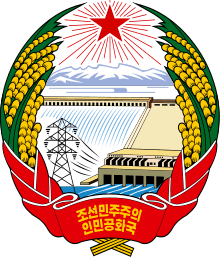China–North Korea relations
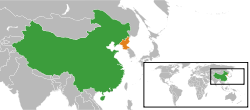 | |
China |
North Korea |
|---|---|
China–North Korea relations (Chinese: 中朝关系, zhōngcháo guānxi Korean: 조중 관계, chojung kwangye) are bilateral between China and North Korea.
China maintains an embassy in the North Korean capital of Pyongyang and a consulate general in Chongjin.[1] The Embassy of North Korea in China is located in Beijing's Chaoyang District, while a consulate general is in Shenyang.
China and North Korea have, in the past, enjoyed close diplomatic relations. However, China–North Korea relations have declined markedly over the past few years. The decline in China–North Korea relations is primarily due to growing concern in China over issues such as North Korea's impoundment of Chinese fishing boats and more importantly its nuclear weapons program.[2][3]
Favorable views of North Korea among Chinese people appear to be receding as well. According to a 2014 BBC World Service Poll, 20% of Chinese people view North Korea's influence positively, with 46% expressing a negative view.[4]
History
Early history and Korean War
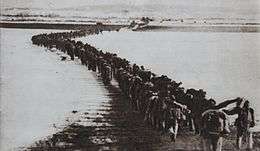
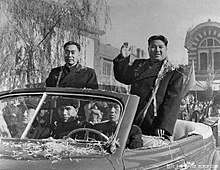
The People's Republic of China and the Democratic People's Republic of Korea exchanged diplomatic recognition on 6 October 1949.
In May 1950, North Korea's Prime minister Kim Il-sung secretly visited Beijing to brief Chinese Communist Party chairman Mao Zedong and the Chinese leadership on his war plans.[5] Following setbacks sustained by the Korean People's Army and the crossing of the 38th parallel by the United Nations Command, in October 1950 China entered the Korean War in support of North Korea.[6] In addition to dispatching the Chinese People's Volunteers to Korea to fight against the United Nations Command, China also received North Korean refugees and students and provided economic aid during the war.[7] Following the signing of the Korean War Armistice in 1953, China, along with members of the Eastern Bloc led by the Soviet Union, provided extensive economic assistance to Pyongyang to support the reconstruction and economic development of North Korea.[8]
1956 August Faction Incident
In 1956, at the 2nd Plenary Session of the 3rd Central Committee, leading pro-China Korean figures known as the Yan'an faction attempted to remove Kim il-sung from power with the support of China and the Soviet Union. This incident has become known as the August Faction Incident and forms the historical basis for north Korean fears of Chinese interference.
Deterioration in 1960s
The 1960s have been characterized as a "contentious" period in Sino-North Korean relations.[9] The Korean Workers Party criticized the Cultural Revolution and described Mao Zedong as “an old fool who has gone out of his mind.”[9][10] The People's Republic of China recalled its Ambassador from Pyongyang in October 1966, and the Red Guard criticized North Korea as being "revisionist" in the Dongfanghong newspaper.[9][11]
Sino-North Korean Mutual Aid and Cooperation Friendship Treaty
In 1961, the two countries signed the Sino-North Korean Mutual Aid and Cooperation Friendship Treaty, whereby China pledged to immediately render military and other assistance by all means to its ally against any outside attack.[12] This treaty was prolonged twice, in 1981 and 2001, with a validity until 2021.
Post-Cold War era
On 1 January 2009, Chinese paramount leader Hu Jintao and North Korean leader Kim Jong-il exchanged greetings and declared 2009 as the "year of China–DPRK friendship," marking 60 years of diplomatic relations between the two countries.[13]
.jpg)
In August 2012, Jang Song-thaek, uncle of Kim Jong-un, met Hu Jintao, General Secretary of the Communist Party of China in Beijing.[14] It has since been widely reported that during their meeting, Jang told Hu Jintao he wished to replace Kim Jong-un with his brother Kim Jong-nam. The meeting was allegedly taped by Zhou Yongkang, then secretary of the Central Political and Legal Affairs Commission, who informed Kim Jong-un of the plot. In December 2013, Jang was executed for treason while in July 2014 Zhou was publicly put under investigation for corruption and other crimes and was arrested in December 2014. These events are said to have marked the beginning of Kim Jong-un's distrust of China, since they had failed to inform him of a plot against his rule, while China took a dislike to Kim for executing their trusted intermediary.[15][16]
On 5 May 2013, North Korea "grabbed," according to Jiang Yaxian, a Chinese government official, another Chinese fishing boat in a series of impounding Chinese fishing boats.[2] "North Korea was demanding 600,000 yuan ($97,600) for its safe return, along with its 16 crew."[2] According to a New York Times article in December 2014, relations had reached a low point.[17]
In March 2016 the North Korean leader Kim Jong-un visited a missile factory, which China strongly condemned, in a report by the state newspaper the People's Daily revealed that the North Korean politics causes instability on the Korean Peninsula and is comparable to the situation in Syria.
The involvement of the United States in the peninsula's affairs in April-May presented a major issue for Sino-American relations in organiser Li Xiaolin's preparations for Xi's visit to the US.[18]
Nuclear weapons program
Since 2003, China has been a participant in six-party talks aimed at resolving the issue of North Korea's nuclear weapons programme.
The Foreign Minister of the People's Republic of China Yang Jiechi said that China "resolutely" opposed the 2013 North Korean nuclear test conducted by North Korea.[19][20] The North Korean ambassador to China, Ji Jae-ryong, was personally informed of this position on 12 February 2013 in a meeting with Yang Jiechi.[19]
In 2016, right after the North Korean nuclear test in January tensions between China and North Korea have further grown, the reaction of China was, "We strongly urge the DPRK side to remain committed to its denuclearization commitment, and stop taking any actions that would make the situation worse," spokesperson Hua Chunying said.[21] On 24 February 2016 the United States and China introduced new sanctions against the North Korean regime conducted within the United Nations context.[22]
see also 2017 North Korean missile tests
The Times of India reported that British Foreign Secretary Boris Johnson saying at a dinner to mark India's independence that the Chinese control 90% of North Korea's trade and it is in the Chinese government's hands to exercise economic pressure on Kim Jong-un to achieve the diplomatic resolution needed to de-escalate tensions in the region.[23]
2017 decline in relations
Due to Chinese support for sanctions against North Korea, relations in 2017 took a negative turn with North Korean state media attacking China directly on at least three occasions.
In February 2017, after China halted imports of coal from North Korea, the Korean Central News Agency (KCNA) said, "this country [China], styling itself a big power, is dancing to the tune of the US while defending its mean behaviour with such excuses that it was meant not to have a negative impact on the living of the people in the DPRK but to check its nuclear program".[24]
In May 2017, KCNA made an unprecedented criticism of China, saying "a string of absurd and reckless remarks are now heard from China every day only to render the present bad situation tenser" and that "China had better ponder over the grave consequences to be entailed by its reckless act of chopping down the pillar of the DPRK-China relations". Accusing China of "big-power chauvinism", KCNA said Chinese support for sanctions against North Korea were "an undisguised threat to an honest-minded neighboring country which has a long history and tradition of friendship" and that "The DPRK will never beg for the maintenance of friendship with China".[25]
In September 2017, KCNA slammed negative editorials by the People's Daily and Global Times, saying "some media of China are seriously hurting the line and social system of the DPRK and threatening the DPRK" and calling them "the dirty excrement of the reactionaries of history" who "spouted such extremely ill-boding words".[26]
2018
In February 2018, the KCNA again criticized Chinese media. According to KCNA, China Central Television "seriously spoiled the atmosphere of the feast by publishing presumptuous comments of individual experts" and the Global Times was condemned for "the behavior of scattering ashes on other’s happy day as they bring the denuclearization issue".[27][28]
In March 2018, Korean Workers' Party Chairman Kim Jong-un met with Chinese Communist Party General Secretary Xi Jinping for the first time in Beijing.[29] Xinhua News Agency reported that the North Korean leader's trip lasted four days. Kim and his wife Ri Sol-ju were met with honour guards and a lavish banquet hosted by Xi Jinping.[30]
Border
China and North Korea share a 1,416-kilometer long border that corresponds to the course of the Yalu and Tumen rivers.
In the 1950s and 1960s, many ethnic Koreans in Northeast China crossed the border into North Korea to escape economic hardship and famine in China. In recent years, the flow of refugees has reversed, with a considerable number of North Koreans fleeing to China.[31] Much of China's trade with North Korea goes through the port of Dandong on the Yalu River.[32]
In February 1997, tourist access to the bridge over the Tumen at Wonjong-Quanhe was allowed.[33]
In May 2012, China and North Korea signed an agreement on the construction and management of the cross-border bridge between Manpo in the Jagang Province of North Korea and Jian in China.[34]
In 2015, a single rogue North Korean soldier killed four ethnic Korean citizens of China who lived along the border of China with North Korea.[35]
Economic relations
.jpg)
China's economic assistance to North Korea accounts for about half of all Chinese foreign aid. Beijing provides the aid directly to Pyongyang, thereby enabling it to bypass the United Nations.[36]
During the period of severe food shortage between 1996 and 1998, Beijing provided unconditional food aid to North Korea.[37]
Trade
China is North Korea's largest trade partner, while North Korea ranked 82nd on the list of China's trade partners (2009 estimate) China provides about half of all North Korean imports and received a quarter of its exports.
| Year | 1995 | 1996 | 1997 | 1998 | 1999 | 2000 | 2001 | 2002 | 2003 | 2004 | 2005 | 2006 | 2007 | 2008 | 2009 |
| Trade turnover (million$) | 549.646 | 565.652 | 656.021 | 407.750 | 370.356 | 488.053 | 737.457 | 738.172 | 1,023.541 | 1,376.718 | 1,581.234 | 1,699.604 | 1,973.974 | 2,787.278 | 2,680.767 |
By 2011 trade had increased to $5.6 billion (₩5.04 trillion).[39] Trade with China represents 57% of North Korea's imports and 42% of its exports. Chinese statistics for 2013 indicate that North Korean exports to China were nearly $3 billion, with imports of about $3.6 billion.[40]
In February 2017, China restricted all coal imports from North Korea until 2018. This is considered to be extremely harmful to the North Korean economy, as coal was the top export of the nation, and China was their top trading partner. China has said this was in line with the UN sanctions against North Korea, but it is speculated that this occurred because of a mix of events, including recent nuclear tests, the suspected assassination of Kim Jong-nam, brother of ruler Kim Jong-un, and pressure on China from the rest of the world and especially the United States.[41][42][43]
On 28 September 2017, in response to new UN Security Council sanctions over a nuclear test earlier in the month, China ordered all North Korean companies operating in China to cease operations within 120 days.[44] By January 2018 customs statistics showed that trade between the two countries had fallen to the lowest level recorded.[45]
Banking
On 7 May 2013, Bank of China, China's biggest foreign exchange bank and other Chinese banks closed the account of North Korea's main foreign exchange bank.[46]
Investments
In 2012, a $45 million investment by China's Haicheng Xiyang Group into an iron-ore powder processing plant failed under what the Chinese called "a nightmare".[47] On 21 February 2016 China quietly ended financial support of North Korea without any media publicity. It is reported to be due to the fallout of relations between the two governments.[48]
Military relations
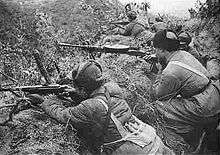
During the Korean War from 1950–53, China assisted North Korea, sending as many as 3 million soldiers,[49] known as the People's Volunteer Army, to support North Korean forces fighting the South Korean and UN on the Korean peninsula. As many as 180,000 Chinese soldiers were killed.[49]
Since the end of the Korean War, the two states have closely cooperated in security and defense issues. In 1975, Kim Il-sung visited Beijing in a failed attempt to solicit support from China for a military invasion of South Korea.[50] On 23 November 2009, Chinese Defense Minister Liang Guanglie visited Pyongyang, the first defense chief to visit since 2006.[51]
See also
Notes and references
- ↑ Embassy of People's Republic of China in the Democratic People's Republic of Korea
- 1 2 3 Jourdan, Adam (19 May 2013). "China seeks release of fishing boat seized by North Korea". Reuters. Retrieved 3 January 2015.
- ↑ WHY CHINA REMAINS NORTH KOREA’S BIGGEST ALLY
- ↑ "Embassy & Consulate of D.P.R.K. (North Korea) in China," Travel China Guide
- ↑ Kathryn Weathersby, "New Russian Documents on the Korean War," Cold War International History Project Bulletin 6/7 (Winter 1995): 40–84.
- ↑ "Q&A: China-North Korea Relationship," New York Times, 13 July 2006.
- ↑ Adam Cathcart and Charles Kraus, "The Bonds of Brotherhood: New Evidence on Sino-North Korean Exchanges, 1950–1954," Journal of Cold War Studies 13, no. 3 (2011): 27–51
- ↑ Zhihua Shen and Yafeng Xia (2012), "China and the Postwar Reconstruction of North Korea, 1953–1961," NKIDP Working Paper #4.
- 1 2 3 Kim, Harry (12 July 2017). "Mythbuster: Beijing's Relationship with Pyongyang". Woodrow Wilson International Center for Scholars.
- ↑ "The DPRK Attitude Toward the So-called 'Cultural Revolution' in China". Translated by Goldberg, Gary. Woodrow Wilson International Center for Scholars. 7 March 1967. Retrieved 12 July 2017.
The Korean comrades speak of the 'thousands of victims during the so-called 'revolution', the 'suicides', the 'political chaos', and the 'chaos in the economy,' about Mao Zedong as 'an old fool who has gone out of his mind.' In lectures they cite instances of political and economic pressure on the DPRK from the Chinese government.
- ↑ Embassy of Hungary in the Soviet Union (25 November 1967). "Report, Embassy of Hungary in the Soviet Union to the Hungarian Foreign Ministry". Translated by Szalontai, Balazs. Woodrow Wilson International Center for Scholars. Retrieved 13 July 2017.
According to the information received from the competent department of the Soviet Foreign Ministry, several signs indicate that Sino-Korean relations keep worsening. Among these signs, we mention first of all that recently new pamphlets were published in Beijing, which contained a sharp attack on the Korean Workers’ Party and the person of Kim Il Sung, threatening the leader of the Korean Workers’ Party with that the Korean people would take vengeance upon him for his revisionist policy.
- ↑ "Treaty of Friendship, Co-operation and Mutual Assistance between the People's Republic of China and the Democratic People's Republic of Korea".
In the event of one of the Contracting Parties being subjected to the armed attack by any state or several states jointly and thus being involved in a state of war, the other Contracting Party shall immediately render military and other assistance by all means at its disposal. (一旦缔约一方受到任何一个国家的或者几个国家联合的武装进攻,因而处于战争状态时,缔约另一方应立即尽其全力给予军事及其他援助)
- ↑ Xinhua, "Chinese, DPRK leaders exchange congratulatory messages on the launch of friendship year," 1 January 2009.
- ↑ https://www.nytimes.com/2012/08/18/world/asia/influential-north-korean-meets-with-chinese-leaders.html
- ↑ https://www.telegraph.co.uk/news/2017/08/24/did-kim-jong-un-kill-uncle-brother-coup-plot-involving-china/
- ↑ https://www3.nhk.or.jp/nhkworld/nhknewsline/backstories/secrettapingsaidtohave/
- ↑ Perlez, Jane (20 December 2014). "Chinese Annoyance With North Korea Bubbles to the Surface". New York Times. Retrieved 3 January 2015.
- ↑ Su Mi, ed. (9 March 2017). "李小林将访美为中美首脑会谈铺路" [Li Xiaolin visits the USA to pave the road for Sino-US summit talks]. DW News (in Chinese). Retrieved 10 May 2017.
- 1 2 Xu Weiwei (13 February 2013). "China 'firmly' opposes North Korea's nuclear test". The Morning Whistle. Archived from the original on 11 April 2013. Retrieved 2 April 2013.
- ↑ "China opposes DPRK's nuclear test".
- ↑ "China firmly opposes DPRK's nuclear test". Xinhua News Agency. Retrieved 6 January 2016.
- ↑ "US and China make 'progress' on N Korea sanctions". BBC News. Retrieved 8 April 2016.
- ↑ "UK keen on working with India to check North Korea, British foreign secretary Boris Johnson says". Times of India. 17 August 2017. Retrieved 17 August 2017.
- ↑ https://www.telegraph.co.uk/news/2017/02/24/north-korea-says-old-ally-china-dancing-tune-us-coal-ban/
- ↑ https://www.reuters.com/article/us-northkorea-china/north-korean-media-issues-rare-criticism-of-china-over-nuclear-warnings-idUSKBN17Z1TA
- ↑ https://adamcathcart.com/2017/09/26/notes-on-the-sino-north-korean-war-of-words/
- ↑ https://www.nknews.org/2018/02/chinese-media-spoiled-the-atmosphere-of-inter-korean-rapprochement-dprk-media/
- ↑ "习近平同金正恩举行会谈" (in Chinese). 中国新闻网. 新华社. 28 March 2018. Archived from the original on 29 March 2018. Retrieved 20 May 2018.
- ↑ "China confirms North Korean leader Kim Jong Un visited Beijing". Reuters. Reuters. Retrieved 28 March 2018.
- ↑ Graham, Chris (28 March 2018). "Kim Jong-un makes first foreign trip as leader for talks in China - and commits to nuclear summit with Donald Trump". The Telegraph. The Telegraph. Retrieved 28 March 2018.
- ↑ Hazel Smith (2012), "Explaining North Korean Migration to China," NKIDP e-Dossier no. 11.
- ↑ Lee, Chang-hak. "China’s Trade with N.K. Via Dandong Exceeds US $200 million", KOTRA, 21 February 2003.
- ↑ Davies, Ian (2000). Regional Co-operation in Northeast Asia The Tumen River Area Development Program, 1990–2000: In Search of a model for regional economic co-operation in Northeast Asia. North Pacific policy papers, 4. Vancouver: Program on Canada-Asia Policy Studies Institute of Asian Research, University of British Columbia. ISBN 978-0-88865-740-4.
- ↑ "Sino-North Korean Bridge Deal Sealed", Daily NK, 11 May 2012.
- ↑ https://www.yahoo.com/news/runaway-n-korean-soldier-kill-four-chinese-reports-060526414.html?bcmt=1420505551797-974622bd-2486-431b-8e29-2290873790fc&ref=gs https://www.yahoo.com/news/china-village-defenceless-against-north-korean-intruders-055043942.html?ref=gs
- ↑ "Donald Trump threatens North Korea with "fire and fury" - As usual, it's not quite clear whether he meant it". The Economist. UK. August 12, 2017. Archived from the original on August 19, 2017. Retrieved August 19, 2017.
- ↑ Scott Snyder, "China’s Evolving Economic and Political Relations with North Korea," in China’s Rise and the Two Koreas (Lynne Rienner Publishers, Inc.: Colorado, USA, 2009), pp. 118–21.
- ↑ Ministry of Commerce of the People's Republic of China
- ↑ "N. Korea's China trade nearly triples in 4 years". China Post. 28 December 2012. Retrieved 7 January 2014.
- ↑ Aidan Foster-Carter (20 February 2014). "South Korea has lost the North to China". Financial Times. Retrieved 1 April 2014.
- ↑ "China to suspend N Korea coal imports". BBC News. 18 February 2017. Retrieved 28 September 2017.
- ↑ "China to suspend coal imports from North Korea". Al Jazeera. Retrieved 28 September 2017.
- ↑ Denyer, Simon (18 February 2017). "China suspends North Korean coal imports, striking at regime's financial lifeline". Washington Post. ISSN 0190-8286. Retrieved 28 September 2017.
- ↑ "China shuts down North Korean companies". BBC News. 28 September 2017. Retrieved 28 September 2017.
- ↑ Mason, Josephine; Li, Pei (2018-02-24). "China exports barely any fuel to North Korea in January: customs". Reuters. Retrieved 2018-02-24.
- ↑ "Bank of China Closes Account of Key North Korean Bank". Reuters. Retrieved 9 May 2013.
- ↑ "North Korea Blasts Chinese Company in Failed Deal". www.nytimes.com. Reuters. 5 September 2012. Retrieved 16 January 2014.
- ↑ https://news.yahoo.com/chinese-banks-freeze-north-korean-accounts-south-korean-044348553--sector.html
- 1 2 "180,000 Chinese soldiers killed in Korean War". China Daily. 28 June 2010. Retrieved 5 April 2013.
- ↑ "East German Documents on Kim Il Sung's April 1975 Trip to Beijing", NKIDP e-Dossier No. 7, May 2012.
- ↑ Associated Press, "China’s Defense Minister Travels to North Korea", The China Post, 23 November 2009.
External links
- Jayshree Bajoria and Beina Xu (2013), "The China-North Korea Relationship," Council on Foreign Relations.
- "China-North Korea Relations," Wilson Center Digital Archive.
- Dick K. Nanto and Mark E. Manyin (2010),"China-North Korea Relations," Congressional Research Service
- Shen Zhihua (2008), "Alliance of 'Tooth and Lips' or Marriage of Convenience?," US-Korea Institute at SAIS WPS 08-09.
- DPRK–China Friendship Goes Down Century after Century at Naenara
.svg.png)
